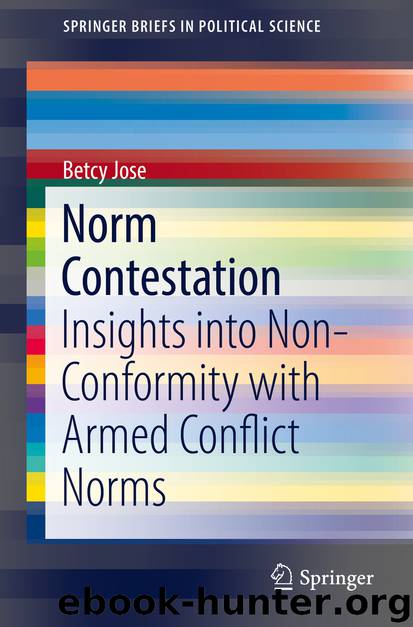Norm Contestation by Betcy Jose

Author:Betcy Jose
Language: eng
Format: epub
Publisher: Springer International Publishing, Cham
That the ICRC decided to publish the Interpretive Guidance, despite the discord, was an exercise of its interpretive power.
“Direct participation in hostilities” is not the only ambiguous language in the Additional Protocols handicapping intersubjective agreement in the distinction principle. There is also much uncertainty as to what “unless and for such time” means in AP I (Kalshoven 1987: 91). The Commentaries to the APs state that loss of immunity is confined to this time period. However, even if actors agreed upon an interpretation of direct participation, international law is unclear on how to determine the start and end time for a civilian’s loss of immunity. The APs’ Commentaries advise that participation is not limited to the actual attack, but also includes the period involving the preparation or return from attack. However, they offer no further instruction as to what acts fall under the umbrella of preparation. For instance, would “unless and for such time” extend to the entire period of membership in a terrorist group, inclusive of rest periods between acts of preparation for an attack, or just the period of actual implementation of the attack (Fenrick 2007: 336–337)? Many argue that this phrase gives rise to the “revolving door” problem whereby a civilian who directly participates in hostilities through the use of a weapon can reclaim his or her immunity simply by dropping it (Queguiner 2003).
The above discussion pertains to ambiguity in the codified norm. The situation with uncodified versions of the norm, those circulating in local contexts, is also replete with missing intersubjective agreement. Civilians themselves varyingly conceptualize who is protected and unprotected in war. The Center for Civilians in Conflict (CIVIC), an NGO that advocates on behalf of civilians in conflict, interviewed civilians who experienced conflict in Bosnia, Libya, Gaza, and Somalia about the ways in which civilians participate in armed conflict. It found that,for people who have lived through conflict, there is no fixed, universal definition of the ‘civilian.’ Instead, interviewees offered many different interpretations of what it means to be a civilian, and these interpretations varied by conflict and interviewee (Boehland 2015: 25).
Download
This site does not store any files on its server. We only index and link to content provided by other sites. Please contact the content providers to delete copyright contents if any and email us, we'll remove relevant links or contents immediately.
The Pirates of Somalia by Jay Bahadur(1619)
Political Theology by Carl Schmitt(1569)
The Holocaust: A New History by Laurence Rees(1505)
The Social Animal by David Brooks(1447)
A Practical Guide to International Arbitration in London by Hilary Heilbron(1424)
Restitution by Restitution(1424)
Pirates of Somalia by Jay Bahadur(1373)
Coercing Virtue by Robert H. Bork(1353)
The Nuremberg Interviews by Leon Goldensohn(1296)
Basic International Corporate Taxation by Sebastiano Garufi(1203)
A History Of Thailand by Baker Chris(1172)
International Trade and Business: Law, Policy and Ethics by Gabriël Moens & Peter Gillies(1136)
The Global Commons by Susan J. Buck(1131)
Asian Waters by Humphrey Hawksley(1113)
Blood Profits by Vanessa Neumann(1107)
The Sovereignty of Human Rights by Macklem Patrick(1105)
Spring Fever: The Illusion of Islamic Democracy by McCarthy Andrew C(1096)
The Nuremberg Trials: The Nazis and their Crimes Against Humanity by Roland Paul(1043)
Crimes Against Humanity: Historical Evolution and Contemporary Application by M. Cherif Bassiouni(1019)
